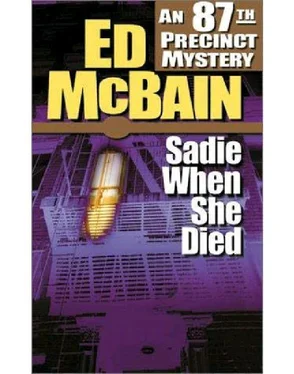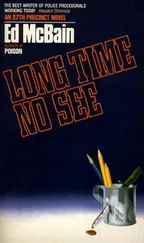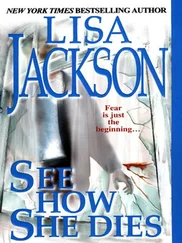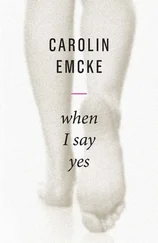Ed McBain - Sadie When She Died
Здесь есть возможность читать онлайн «Ed McBain - Sadie When She Died» весь текст электронной книги совершенно бесплатно (целиком полную версию без сокращений). В некоторых случаях можно слушать аудио, скачать через торрент в формате fb2 и присутствует краткое содержание. Жанр: Полицейский детектив, на английском языке. Описание произведения, (предисловие) а так же отзывы посетителей доступны на портале библиотеки ЛибКат.
- Название:Sadie When She Died
- Автор:
- Жанр:
- Год:неизвестен
- ISBN:нет данных
- Рейтинг книги:4 / 5. Голосов: 1
-
Избранное:Добавить в избранное
- Отзывы:
-
Ваша оценка:
- 80
- 1
- 2
- 3
- 4
- 5
Sadie When She Died: краткое содержание, описание и аннотация
Предлагаем к чтению аннотацию, описание, краткое содержание или предисловие (зависит от того, что написал сам автор книги «Sadie When She Died»). Если вы не нашли необходимую информацию о книге — напишите в комментариях, мы постараемся отыскать её.
Sadie When She Died — читать онлайн бесплатно полную книгу (весь текст) целиком
Ниже представлен текст книги, разбитый по страницам. Система сохранения места последней прочитанной страницы, позволяет с удобством читать онлайн бесплатно книгу «Sadie When She Died», без необходимости каждый раз заново искать на чём Вы остановились. Поставьте закладку, и сможете в любой момент перейти на страницу, на которой закончили чтение.
Интервал:
Закладка:
But why? To give it back to her husband in spades? If he was playing around with someone each and every weekend, maybe Sarah decided to beat him at his own game, become not only Sadie, but a Sadie who was, in the words of her various admirers, “a crazy bitch,” “a stupid twat,” and “a wild one.” It seemed entirely possible that the only thing Carella would learn from Richard Fenner or Sal Decotto was that they shared identical opinions of the woman they had similarly used and abused. And affirmation of a conclusion leading nowhere was a waste of time. Carella tossed Sarah’s little black book into the manila folder bearing the various reports on the case, and turned his attention to the information Artie Brown had brought in last night.
Cherchez la femme was a handy little dictum perhaps used more often by the Sûreté than by the 87th. But without trying to cherche any femme, Brown had inadvertently come across one anyway, a thirty-year-old redhead who lived on the eleventh floor at 812 North Crane and with whom Gerald Fletcher had spent almost four hours the night before. It would have been a simple matter to hit the redhead’s building and find out exactly who she was, but Carella decided against such a course of action. A chat with the superintendent, however quiet, a questioning of neighbors, however discreet, might get back to the woman herself, and serve to alert Fletcher. Fletcher was the suspect. Carella sometimes had to remind himself of that fact. Sarah had been playing around with an odd assortment of men and women, five according to her own record (and God knew how many more she had not listed, and God knew what the “TG” after four of the names meant); her blatant infidelity provided Fletcher with a strong motive, despite his own weekend sorties into realms as yet uncharted. So why take Carella to his wife’s unhappy haunts, why show Carella that he had good and sufficient reason to rip that knife across her belly? And why the hell offer to get a good defense attorney for the boy who had already been indicted for the slaying and who, unless somebody came up with something concrete damn soon, might very well be convicted of the crime?
Sometimes Carella wondered who was doing what to whom.
At five o’clock that evening, he relieved Detective Hal Willis outside Fletcher’s office building downtown, and then followed Fletcher to a department store in midtown Isola. Carella did not normally go in for cops-and-robbers disguises, but Fletcher knew exactly what he looked like and so he was wearing a false mustache stuck to his upper lip with spirit gum, a wig with longer hair than his own and of a different color (a dirty blond whereas his own was brown), and a pair of sunglasses. The disguise, he was certain, would not have fooled Fletcher at close range. But he did not intend to get that close, and he felt pretty secure he would not be made. He was, in fact, more nervous about losing Fletcher than about being spotted by him.
The store was thronged with late shoppers. This was Tuesday, December 21, four days to the big one, only three more days of shopping once the stores closed tonight at nine. Hot desperation flowed beneath the cool white plastic icicles that hung from the ceiling, panic in wonderland, the American anxiety syndrome never more evident than at Christmas, when the entire nation became a ruthless jackpot—Two Hundred Million Neediest gifting and getting, with a gigantic hangover waiting just around the new year’s corner. Gerald Fletcher shoved through the crowd of holiday shoppers like a quarterback moving the ball downfield without benefit of blockers. Carella, like a reticent tackler, followed some twenty feet behind.
The elevator would be a danger spot. Carella saw the elevator bank at the far end of the store, and knew that Fletcher was heading directly for it, and weighed the chances of being spotted in a crowded car against the chances of losing Fletcher if he did not follow immediately on his heels. He did not know how many thousands of people were in the store at that moment; he did know that if he allowed Fletcher to get into an elevator without him, the surveillance was blown. The elevator would stop at every floor, the way most department-store elevators did, and Fletcher could get out at any one of them, then try to find him again.
An elevator arrived. Its door opened, and Fletcher waited while the passengers disembarked and then stepped into the car together with half a dozen shoppers. Carella ungentlemanly shoved his way past a woman in a leopard coat and got into the car with his back to Fletcher, who was standing against the rear wall. The car, as Carella had surmised, stopped at every floor. He studiously kept his back to the rear of the car, moving aside whenever anyone wanted to get out. On the fifth floor, he heard Fletcher call, “Getting out, please,” and then felt him coming toward the front of the car, and saw him stepping out, and waited for the count of three before he, himself, moved forward, much to the annoyance of the elevator operator, who was starting to close the door.
Fletcher had walked off to the left. Carella spotted him moving swiftly up one of the aisles, looking about at the signs identifying each of the various departments, and stopping at one marked INTIMATE APPAREL . Carella walked into the next aisle over, pausing to look at women’s robes and kimonos, keeping one eye on Fletcher, who was in conversation with the lingerie salesgirl. The girl nodded, smiled, and showed him what appeared to be either a slip or a short nightgown, holding the garment up against her ample bosom to model it for Fletcher, who nodded, and said something else to her. The girl disappeared under the counter, to reappear several moments later, her hands overflowing with gossamer undergarments, which she spread on the counter before Fletcher, awaiting his further choice.
“May I help you, sir?” a voice said, and Carella turned to find a stocky woman at his elbow, gray hair, black-rimmed spectacles, wearing army shoes and a black dress with a small white collar. She looked exactly like a prison matron, right down to the suspicious smile that silently accused him of being a junkie shoplifter or worse.
“Thank you, no,” Carella said. “I’m just looking.”
Fletcher was making his selections, pointing now to this garment, now to another. The salesgirl wrote up the order, and Fletcher reached into his wallet to give her either cash or a credit card, it was difficult to tell from this distance. He chatted with the girl a moment longer, and then walked off toward the elevator bank.
“Are you sure I can’t assist you?” the prison matron said, and Carella immediately answered, “I’m positive,” and moved swiftly toward the lingerie counter. Fletcher had left the counter without a package in his arms, which meant he was sending his purchases. You did not send dainty underthings to a prize fighter, and Carella wanted very much to know exactly which woman was to be the recipient of the “intimate apparel.” The salesgirl was already gathering up Fletcher’s selections—a black half-slip, a wildly patterned Pucci chemise, a peach-colored baby-doll nightgown with matching bikini panties, and four other pairs of panties, blue, black, white, and beige, each trimmed with lace around the leg-holes. The girl looked up.
“Yes, sir,” she said, “may I help you?”
Carella opened his wallet and produced his shield. “Police officer,” he said. “I’m interested in the order you just wrote up.”
The girl was perhaps nineteen years old, a college girl working in the store for the Christmas rush. The most exciting thing that had happened on the job, until this very moment, was an elderly Frenchman asking her if she would like to spend the month of February on his yacht in the Mediterranean. Speechlessly, the girl studied the shield, her eyes bugging. It suddenly occurred to Carella that Fletcher might have had the purchases sent to his home address, in which case all this undercover work was merely a waste of time. Well, he thought, you win some, you lose some.
Читать дальшеИнтервал:
Закладка:
Похожие книги на «Sadie When She Died»
Представляем Вашему вниманию похожие книги на «Sadie When She Died» списком для выбора. Мы отобрали схожую по названию и смыслу литературу в надежде предоставить читателям больше вариантов отыскать новые, интересные, ещё непрочитанные произведения.
Обсуждение, отзывы о книге «Sadie When She Died» и просто собственные мнения читателей. Оставьте ваши комментарии, напишите, что Вы думаете о произведении, его смысле или главных героях. Укажите что конкретно понравилось, а что нет, и почему Вы так считаете.












